formerly eScholarship Editions


|
|
|
|
Your search for
'Latin American Studies' in subject
found 86 book(s). | Modify Search | Displaying 41 - 60 of 86 book(s) | |
| 41. | 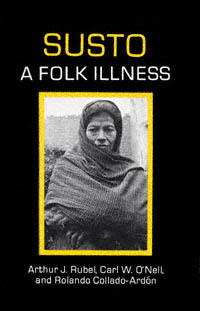 | Title: Susto, a folk illness Author: Rubel, Arthur J Published: University of California Press, 1984 Subjects: Anthropology | Medical Anthropology | Latin American Studies | Psychology Publisher's Description: Widespread throughout Latin America, susto is a folk illness associated with a broad array of symptoms. It is considered by susceptible populations to be a sickness caused by the separation of soul and body which is precipitated by a supernatural force. Most studies of culture-bound diseases have relied on descriptive approaches that focus on pathologies derived from medical textbooks. This study takes an interdisciplinary approach, looking for explanations of susto in the interaction of social, physiological, and psychological factors. [brief] Similar Items |
| 42. | 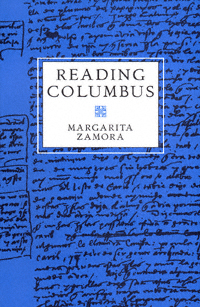 | Title: Reading Columbus Author: Zamora, Margarita Published: University of California Press, 1993 Subjects: Literature | Latin American Studies | Latin American History | European Literature Publisher's Description: Christopher Columbus authored over a hundred documents, many of them letters giving testimony on the Discovery to Isabela and Ferdinand. In this first book in English to focus specifically on these writings, Margarita Zamora offers an original analysis of their textual problems and ideological implications. Her comprehensive study takes into account the newly discovered "Libro Copiador," which includes previously unknown letters from Columbus to the Crown.Zamora examines those aspects of the texts that have caused the most anxiety and disagreement among scholars - questions concerning Columbus's destination, the authenticity and authority of the texts attributed to him, Las Casas's editorial role, and Columbus's views on the Indians. In doing so she opens up the vast cultural context of the Discovery. Exploring the ways in which the first images of America as seen through European eyes both represented and helped shape the Discovery, she maps the inception and growth of a discourse that was to dominate the colonizing of the New World. [brief] Similar Items |
| 43. | 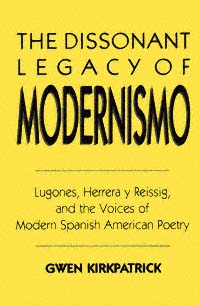 | Title: The dissonant legacy of modernismo: Lugones, Herrera y Reissig, and the voices of modern Spanish American poetry Author: Kirkpatrick, Gwen Published: University of California Press, 1989 Subjects: Latin American Studies | European Literature | Poetry Publisher's Description: This is a provocative new reading of a crucial and often misunderstood period of Spanish American literature. Most studies of modernismo have focused on the poetry of Rubén Darío and have noted the movement's aestheticism and its unmistakable French influences. Kirkpatrick concentrates instead on important negations of harmony and the movement's internal dismantling of its own precepts. Major contradictions within the movement itself are revealed through the works of the Argentine Leopoldo Lugones and the Uruguayan Julio Herrera y Reissig. Extending her analysis to later writers such as Ramón López Velarde, César Vallejo, and Alfonsina Storni, Kirkpatrick shows the changes that foreshadow the more overt experiments of these poets and illuminates the continuity between the modernistas and later generations. [brief] Similar Items |
| 44. | 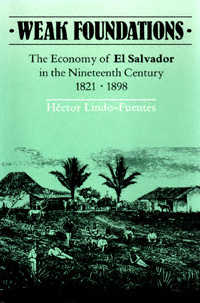 | Title: Weak foundations: the economy of El Salvador in the nineteenth century Author: Lindo-Fuentes, Héctor 1952- Published: University of California Press, 1991 Subjects: History | Latin American Studies | Economics and Business Publisher's Description: Héctor Lindo-Fuentes provides the first in-depth economic history of El Salvador during the crucial decades of the nineteenth century. Before independence in 1821, the isolated territory that we now call El Salvador was a subdivision of the Captaincy General of Guatemala and had only 250,000 inhabitants. Both indigo production, the source of wealth for the country's tiny elite and its main link to the outside world, and subsistence agriculture, which engaged the majority of the population, involved the use of agricultural techniques that had not changed for two hundred years. By 1900, however, El Salvador's primary export was coffee, a crop that demanded relatively sophisticated agricultural techniques and the support of an elaborate internal finance and marketing network. The coffee planters came to control the state apparatus, writing laws that secured their access to land, imposing taxes that paid for a transportation network designed to service their plantations, building ports to expedite coffee exports, and establishing a banking system to finance the new crop. Weak Foundations shows how the parallel process of state-building and expansion of the coffee industry resulted in the formation of an oligarchy that was to rule El Salvador during the twentieth century. Historians and economists interested in the "routes to underdevelopment" followed by Latin American and other "Third World" countries will find this analysis thorough and provocative. [brief] Similar Items |
| 45. | 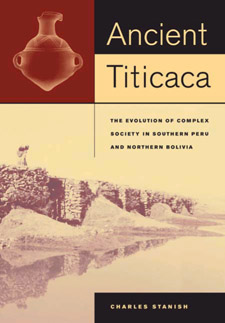 | Title: Ancient Titicaca: the evolution of complex society in southern Peru and northern Bolivia Author: Stanish, Charles 1956- Published: University of California Press, 2003 Subjects: Anthropology | Cultural Anthropology | Archaeology | Latin American Studies Publisher's Description: One of the richest and most complex civilizations in ancient America evolved around Lake Titicaca in southern Peru and northern Bolivia. This book is the first comprehensive synthesis of four thousand years of prehistory for the entire Titicaca region. It is a fascinating story of the transition from hunting and gathering to early agriculture, to the formation of the Tiwanaku and Pucara civilizations, and to the double conquest of the region, first by the powerful neighboring Inca in the fifteenth century and a century later by the Spanish Crown. Based on more than fifteen years of field research in Peru and Bolivia, Charles Stanish's book brings together a wide range of ethnographic, historical, and archaeological data, including material that has not yet been published. This landmark work brings the author's intimate knowledge of the ethnography and archaeology in this region to bear on major theoretical concerns in evolutionary anthropology. Stanish provides a broad comparative framework for evaluating how these complex societies developed. After giving an overview of the region's archaeology and cultural history, he discusses the history of archaeological research in the Titicaca Basin, as well as its geography, ecology, and ethnography. He then synthesizes the data from six archaeological periods in the Titicaca Basin within an evolutionary anthropological framework. Titicaca Basin prehistory has long been viewed through the lens of first Inca intellectuals and the Spanish state. This book demonstrates that the ancestors of the Aymara people of the Titicaca Basin rivaled the Incas in wealth, sophistication, and cultural genius. The provocative data and interpretations of this book will also make us think anew about the rise and fall of other civilizations throughout history. [brief] Similar Items |
| 46. | 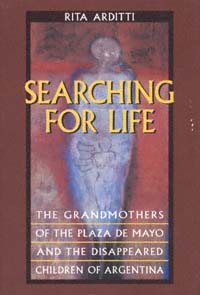 | Title: Searching for life: the grandmothers of the Plaza de Mayo and the disappeared children of Argentina Author: Arditti, Rita 1934- Published: University of California Press, 1999 Subjects: Latin American Studies | Sociology | Gender Studies Publisher's Description: FROM THE BOOK :"I want to touch you and kiss you.""You are my mother's sister and only one year older; you must have something of my mother in you." - A found child after being returned to her family Searching for Life traces the courageous plight of the Grandmothers of the Plaza de Mayo, a group of women who challenged the ruthless dictatorship that ruled Argentina from 1976 to 1983. Acting as both detectives and human rights advocates in an effort to find and recover their grandchildren, the Grandmothers identified fifty-seven of an estimated 500 children who had been kidnapped or born in detention centers. The Grandmothers' work also led to the creation of the National Genetic Data Bank, the only bank of its kind in the world, and to Article 8 of the United Nations Convention on the Rights of the Child, the "right to identity," that is now incorporated in the new adoption legislation in Argentina. Rita Arditti has conducted extensive interviews with twenty Grandmothers and twenty-five others connected with their work; her book is a testament to the courage, persistence, and strength of these "traditional" older women.The importance of the Grandmothers' work has effectively transcended the Argentine situation. Their tenacious pursuit of justice defies the culture of impunity and the historical amnesia that pervades Argentina and much of the rest of the world today. In addition to reconciling the "living disappeared" with their families of origin, these Grandmothers restored a chapter of history that, too, had been abducted and concealed from its rightful heirs. [brief] Similar Items |
| 47. | 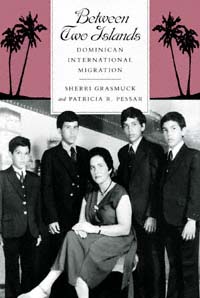 | Title: Between two islands: Dominican international migration Author: Grasmuck, Sherri Published: University of California Press, 1991 Subjects: Sociology | Latino Studies | Latin American Studies | Anthropology Publisher's Description: Popular notions about migration to the United States from Latin America and the Caribbean are too often distorted by memories of earlier European migrations and by a tendency to generalize from the more familiar cases of Mexico and Puerto Rico. Between Two Islands is an interdisciplinary study of Dominican migration, challenging many widespread, yet erroneous, views concerning the socio-economic background of new immigrants and the causes and consequences of their move to the United States.Eschewing monocausal treatments of migration, the authors insist that migration is a multifaceted process involving economic, political, and socio-cultural factors. To this end, they introduce an innovative analytical framework which includes such determinants as the international division of labor; state policy in the sending and receiving societies; class relations; transnational migrant households; social networks; and gender and generational hierarchies.By adopting this multidimensional approach, Grasmuck and Pessar are able to account for many intriguing paradoxes of Dominican migration and development of the Dominican population in the U.S. For example, why is it that the peak in migration coincided with a boom in Dominican economic growth? Why did most of the immigrants settle in New York City at the precise moment the metropolitan economy was experiencing stagnation and severe unemployment? And why do most immigrants claim to have achieved social mobility and middle-class standing despite employment in menial blue-collar jobs?Until quite recently, studies of international migration have emphasized the male migrant, while neglecting the role of women and their experiences. Grasmuck and Pessar's attempt to remedy this uneven perspective results in a better overall understanding of Dominican migration. For instance, they find that with regard to wages and working conditions, it is a greater liability to be female than to be without legal status. They also show that gender influences attitudes toward settlement, return, and workplace struggle.Finally, the authors explore some of the paradoxes created by Dominican migration. The material success achieved by individual migrant households contrasts starkly with increased socio-economic inequality in the Dominican Republic and polarized class relations in the United States.This is an exciting and important work that will appeal to scholars and policymakers interested in immigration, ethnic studies, and the continual reshaping of urban America. [brief] Similar Items |
| 48. | 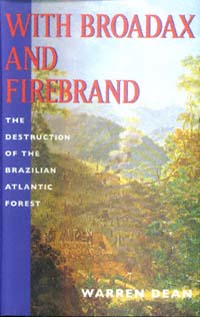 | Title: With broadax and firebrand: the destruction of the Brazilian Atlantic forest Author: Dean, Warren Published: University of California Press, 1997 Subjects: Environmental Studies | Latin American Studies | Natural History Publisher's Description: Warren Dean chronicles the chaotic path to what could be one of the greatest natural disasters of modern times: the disappearance of the Atlantic Forest. A quarter the size of the Amazon Forest, and the most densely populated region in Brazil, the Atlantic Forest is now the most endangered in the world. It contains a great diversity of life forms, some of them found nowhere else, as well as the country's largest cities, plantations, mines, and industries. Continual clearing is ravaging most of the forested remnants.Dean opens his story with the hunter-gatherers of twelve thousand years ago and takes it up to the 1990s - through the invasion of Europeans in the sixteenth century; the ensuing devastation wrought by such developments as gold and diamond mining, slash-and-burn farming, coffee planting, and industrialization; and the desperate battles between conservationists and developers in the late twentieth century.Based on a great range of documentary and scientific resources, With Broadax and Firebrand is an enormously ambitious book. More than a history of a tropical forest, or of the relationship between forest and humans, it is also a history of Brazil told from an environmental perspective. Dean writes passionately and movingly, in the fierce hope that the story of the Atlantic Forest will serve as a warning of the terrible costs of destroying its great neighbor to the west, the Amazon Forest. [brief] Similar Items |
| 49. | 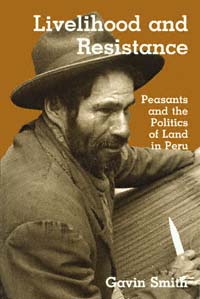 | Title: Livelihood and resistance: peasants and the politics of land in Peru Author: Smith, Gavin Published: University of California Press, 1989 Subjects: Anthropology | Cultural Anthropology | Latin American Studies Similar Items |
| 50. | 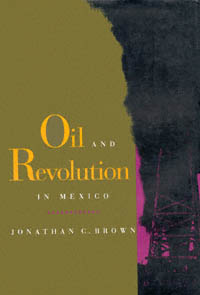 | Title: Oil and revolution in Mexico Author: Brown, Jonathan C. (Jonathan Charles) 1942- Published: University of California Press, 1993 Subjects: History | Latin American History | Latin American Studies | Economics and Business Publisher's Description: Anyone contemplating the consequences of foreign investment in Latin America will profit from reading this book. As Jonathan Brown shows, the dynamic growth of the Mexican oil industry resulted from both the domination of foreign capital and Mexico's own economic restructuring, conditions similar to those under which free-market reforms are being adopted throughout the hemisphere today.Brown's research into the operations of the British and American oil companies in Mexico between 1880 and 1920 reveals their involvement in the events that led the country to revolution in 1910. He weaves a fascinating, exciting story out of the maneuverings among oil men, politicians, diplomats, and workers in a period of massive social upheaval.Oil companies brought capital, technology, and jobs to Mexico, but they also threatened its deeply rooted social heritage. Brown shows that the Mexican response to this double-edged situation was far more effective than has been recognized. Mexicans of all classes were remarkably successful in imposing their own traditions on the powerful companies.Lively, provocative but evenhanded, with darts of wry humor, this study will engage a wide variety of readers: business, economic, political, labor, and social historians and students of Latin America, foreign investment, and international relations. [brief] Similar Items |
| 51. | 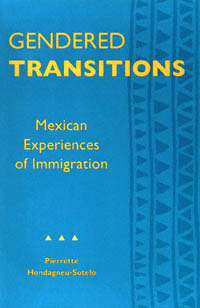 | Title: Gendered transitions: Mexican experiences of immigration Author: Hondagneu-Sotelo, Pierrette Published: University of California Press, 1994 Subjects: Sociology | Latin American Studies | Gender Studies | Chicano Studies | Women's Studies Publisher's Description: The momentous influx of Mexican undocumented workers into the United States over the last decades has spurred new ways of thinking about immigration. Pierrette Hondagneu-Sotelo's incisive book enlarges our understanding of these recently arrived Americans and uncovers the myriad ways that women and men recreate families and community institutions in a new land.Hondagneu-Sotelo argues that people do not migrate as a result of concerted household strategies, but as a consequence of negotiations often fraught with conflict in families and social networks. Migration and settlement transform long-held ideals and lifestyles. Traditional patterns are reevaluated, and new relationships - often more egalitarian - emerge. Women gain greater personal autonomy and independence as they participate in public life and gain access to both social and economic influence previously beyond their reach.Bringing to life the experiences of undocumented immigrants and delineating the key role of women in newly established communities, Gendered Transitions challenges conventional assumptions about gender and migration. It will be essential reading for demographers, historians, sociologists, and policymakers."I've opened my eyes. Back there, they say 'no.' You marry, and no, you must stay home. Here, it's different. You marry, and you continue working. Back in Mexico, it's very different. There is very much machismo in those men." - A Mexican woman living in the United States [brief] Similar Items |
| 52. | 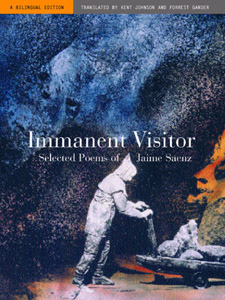 | Title: Immanent visitor: selected poems of Jaime Saenz Author: Sáenz, Jaime Published: University of California Press, 2002 Subjects: Literature | Poetry | Latin American Studies | Literature in Translation Publisher's Description: Immanent Visitor is the first English-language translation of the work of Bolivia's greatest and most visionary twentieth-century poet. A poète maudit, Jaime Saenz rejected the conventions of polite society and became a monk in service of his own imagination. Apocalyptic and occult in his politics, a denizen of slum taverns, unashamedly bisexual, insistently nocturnal in his artistic affairs, and secretive in his leadership of a select group of writers, Saenz mixed the mystical and baroque with the fantastic, the psychological, and the symbolic. In masterly translations by two poet-translators, Kent Johnson and Forrest Gander, Saenz's strange, innovative, and wildly lyrical poems reveal a literary legacy of fierce compassion and solidarity with indigenous Bolivian cultures and with the destitute, the desperate, and the disenfranchised of that unreal city, La Paz. In long lines, in odes that name desire, with Whitmanesque anaphora, in exclamations and repetitions, Saenz addresses the reader, the beloved, and death in one extended lyrical gesture. The poems are brazenly affecting. Their semantic innovation is notable in the odd heterogeneity of formal and tonal structures that careen unabashedly between modes and moods; now archly lyrical, now arcanely symbolic, now colloquial, now trancelike. As Saenz's reputation continues to grow throughout the world, these inspired translations and the accompanying Spanish texts faithfully convey the poet's unique vision and voice to English-speaking readers. [brief] Similar Items |
| 53. | 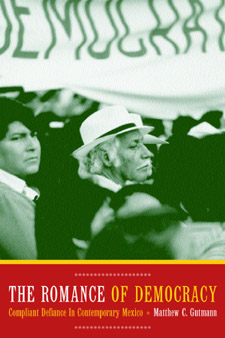 | Title: The romance of democracy: compliant defiance in contemporary Mexico Author: Gutmann, Matthew C 1953- Published: University of California Press, 2002 Subjects: Anthropology | Latino Studies | Latin American Studies | Sociology | Urban Studies Publisher's Description: The Romance of Democracy gives a unique insider perspective on contemporary Mexico by examining the meaning of democracy in the lives of working-class residents in Mexico City today. A highly absorbing and vividly detailed ethnographic study of popular politics and official subjugation, the book provides a detailed, bottom-up exploration of what men and women think about national and neighborhood democracy, what their dreams are for a better society, and how these dreams play out in their daily lives. Based on extensive fieldwork in the same neighborhood he discussed in his acclaimed book The Meanings of Macho, Matthew C. Gutmann now explores the possibilities for political and social change in the world's most populous city. In the process he provides a new perspective on many issues affecting Mexicans countrywide. [brief] Similar Items |
| 54. |  | Title: Hidden heritage: the legacy of the Crypto-Jews Author: Jacobs, Janet Liebman Published: University of California Press, 2002 Subjects: Religion | Latin American Studies | Cultural Anthropology | Jewish Studies | Sociology | Judaism Publisher's Description: This study of contemporary crypto-Jews - descendants of European Jews forced to convert to Christianity during the Spanish Inquisition - traces the group's history of clandestinely conducting their faith and their present-day efforts to reclaim their past. Janet Liebman Jacobs masterfully combines h . . . [more] Similar Items |
| 55. | 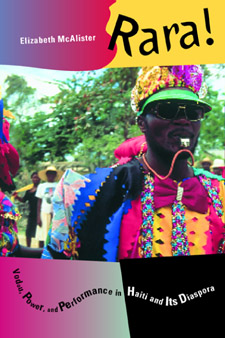 | Title: Rara!: vodou, power, and performance in Haiti and its diaspora Author: McAlister, Elizabeth A Published: University of California Press, 2002 Subjects: Religion | Cultural Anthropology | African American Studies | American Studies | Latin American Studies Publisher's Description: Rara is a vibrant annual street festival in Haiti, when followers of the Afro-Creole religion called Vodou march loudly into public space to take an active role in politics. Working deftly with highly original ethnographic material, Elizabeth McAlister shows how Rara bands harness the power of Vodou . . . [more] Similar Items |
| 56. | 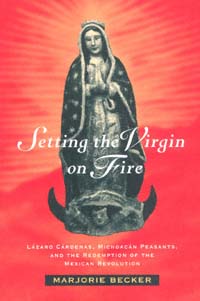 | Title: Setting the Virgin on fire: Lázaro Cárdenas, Michoacán peasants, and the redemption of the Mexican Revolution Author: Becker, Marjorie 1952- Published: University of California Press, 1996 Subjects: History | Latin American Studies | Latin American History | Anthropology | Gender Studies Publisher's Description: In this beautifully written work, Marjorie Becker reconstructs the cultural encounters which led to Mexico's post-revolutionary government. She sets aside the mythology surrounding president Lázaro Cárdenas to reveal his dilemma: until he and his followers understood peasant culture, they could not govern.This dilemma is vividly illustrated in Michoacán. There, peasants were passionately engaged in a Catholic culture focusing on the Virgin Mary. The Cardenistas, inspired by revolutionary ideas of equality and modernity, were oblivious to the peasants' spirituality and determined to transform them. A series of dramatic conflicts forced Cárdenas to develop a government that embodied some of the peasants' complex culture.Becker brilliantly combines concerns with culture and power and a deep historical empathy to bring to life the men and women of her story. She shows how Mexico's government today owes much of its subtlety to the peasants of Michoacán. [brief] Similar Items |
| 57. | 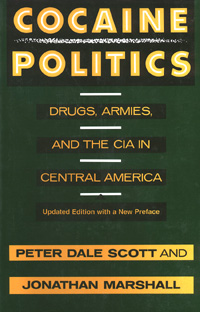 | Title: Cocaine politics: drugs, armies, and the CIA in Central America Author: Scott, Peter Dale Published: University of California Press, 1991 Subjects: Politics | Latin American Studies | Sociology | American Studies | Public Policy Similar Items |
| 58. | 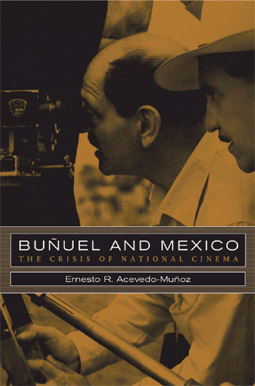 | Title: Buñuel and Mexico: the crisis of national cinema Author: Acevedo-Muñoz, Ernesto R 1968- Published: University of California Press, 2003 Subjects: Cinema and Performance Arts | Latin American History | Latin American Studies Publisher's Description: Though Luis Buñuel, one of the most important filmmakers of the twentieth century, spent his most productive years as a director in Mexico, film histories and criticism invariably pay little attention to his work during this period. The only English-language study of Buñuel's Mexican films, this book is the first to explore a significant but neglected area of this filmmaker's distinguished career and thus to fill a gap in our appreciation and understanding of both Buñuel's achievement and the history of Mexican film. Ernesto Acevedo-Muñoz considers Buñuel's Mexican films - made between 1947 and 1965 - within the context of a national and nationalist film industry, comparing the filmmaker's employment of styles, genres, character types, themes, and techniques to those most characteristic of Mexican cinema. In this study Buñuel's films emerge as a link between the Classical Mexican cinema of the 1930s through the 1950s and the "new" Cinema of the 1960s, flourishing in a time of crisis for the national film industry and introducing some of the stylistic and conceptual changes that would revitalize Mexican cinema. [brief] Similar Items |
| 59. | 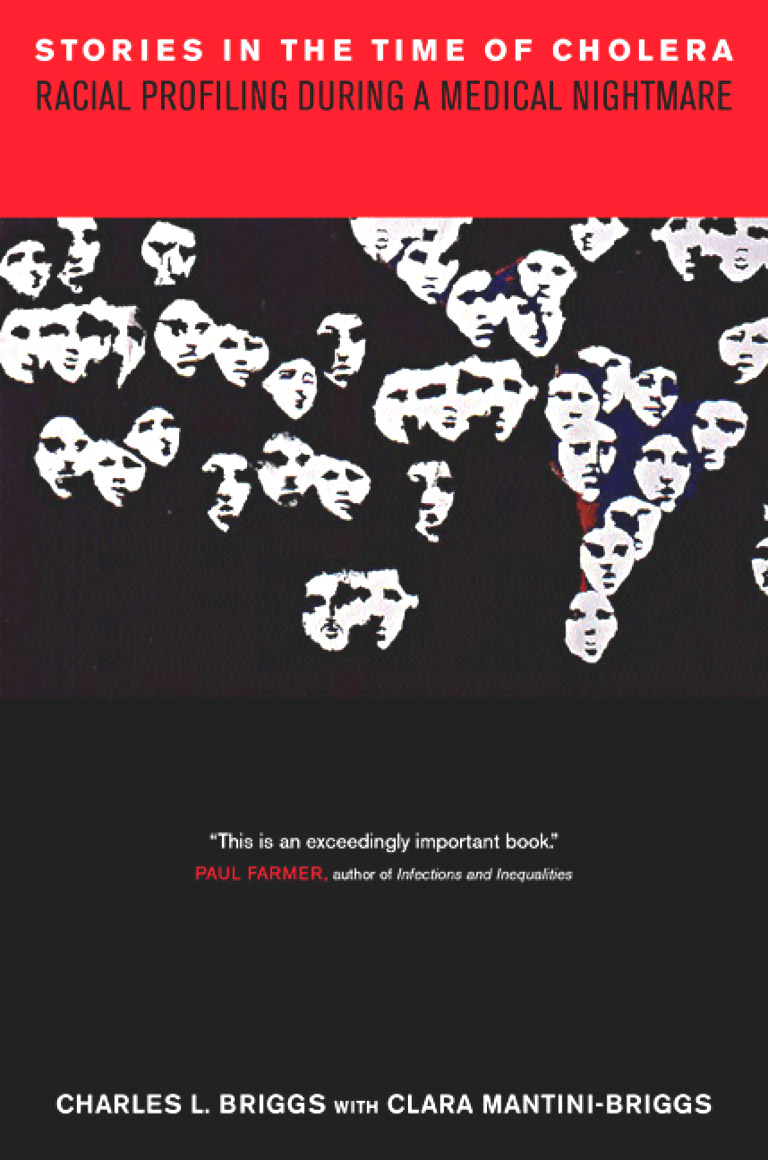 | Title: Stories in the time of cholera: racial profiling during a medical nightmare Author: Briggs, Charles L 1953- Published: University of California Press, 2003 Subjects: Anthropology | Latin American Studies | Ethnic Studies | Disease | Medical Anthropology Publisher's Description: Cholera, although it can kill an adult through dehydration in half a day, is easily treated. Yet in 1992-93, some five hundred people died from cholera in the Orinoco Delta of eastern Venezuela. In some communities, a third of the adults died in a single night, as anthropologist Charles Briggs and Clara Mantini-Briggs, a Venezuelan public health physician, reveal in their frontline report. Why, they ask in this moving and thought-provoking account, did so many die near the end of the twentieth century from a bacterial infection associated with the premodern past? It was evident that the number of deaths resulted not only from inadequacies in medical services but also from the failure of public health officials to inform residents that cholera was likely to arrive. Less evident were the ways that scientists, officials, and politicians connected representations of infectious diseases with images of social inequality. In Venezuela, cholera was racialized as officials used anthropological notions of "culture" in deflecting blame away from their institutions and onto the victims themselves. The disease, the space of the Orinoco Delta, and the "indigenous ethnic group" who suffered cholera all came to seem somehow synonymous. One of the major threats to people's health worldwide is this deadly cycle of passing the blame. Carefully documenting how stigma, stories, and statistics circulate across borders, this first-rate ethnography demonstrates that the process undermines all the efforts of physicians and public health officials and at the same time contributes catastrophically to epidemics not only of cholera but also of tuberculosis, malaria, AIDS, and other killers. The authors have harnessed their own outrage over what took place during the epidemic and its aftermath in order to make clear the political and human stakes involved in the circulation of narratives, resources, and germs. [brief] Similar Items |
| 60. | 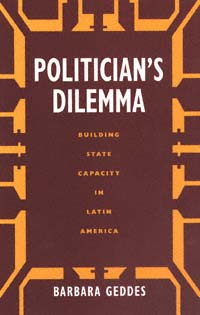 | Title: Politician's dilemma: building state capacity in Latin America Author: Geddes, Barbara Published: University of California Press, 1994 Subjects: Latin American Studies | Economics and Business | Latin American History | Politics Publisher's Description: In Latin America as elsewhere, politicians routinely face a painful dilemma: whether to use state resources for national purposes, especially those that foster economic development, or to channel resources to people and projects that will help insure political survival and reelection. While politicians may believe that a competent state bureaucracy is intrinsic to the national good, political realities invariably tempt leaders to reward powerful clients and constituents, undermining long-term competence. Politician's Dilemma explores the ways in which political actors deal with these contradictory pressures and asks the question: when will leaders support reforms that increase state capacity and that establish a more meritocratic and technically competent bureaucracy?Barbara Geddes brings rational choice theory to her study of Brazil between 1930 and 1964 and shows how state agencies are made more effective when they are protected from partisan pressures and operate through merit-based recruitment and promotion strategies. Looking at administrative reform movements in other Latin American democracies, she traces the incentives offered politicians to either help or hinder the process.In its balanced insight, wealth of detail, and analytical rigor, Politician's Dilemma provides a powerful key to understanding the conflicts inherent in Latin American politics, and to unlocking possibilities for real political change. [brief] Similar Items |